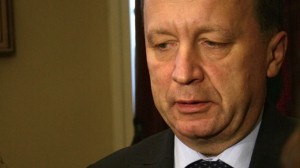
The past year has not been kind to to the Lithuanian economy or Prime Minister Andrius Kubilius' strained coalition. Photo by Nathan Greenhalgh.
VILNIUS — The current Lithuanian government turned one year old on Monday, and it’s been a difficult 12-month tenure.
Defined by the global credit crisis, double-digit gross domestic product decline and unemployment, deep dissatisfaction with the government and record levels of emigration, the past year saw Lithuania’s economy become one of the worst-performing in the world after years of record growth.
The government presided over a time where they were largely prey to forces beyond their control, either from the collapse of Wall Street or the hangover from the Scandinavian bank-driven credit binge that earlier this decade made the Baltic states one of the most attractive to foreign investors.
Now, nearly 14 percent of working-age people are unemployed. Ninety percent of all Lithuanians are dissatisfied with their government. Over 18,000 Lithuanians expatriated by the end of October, a number that, even with two months left in the year, tops last year’s record.
Light at the end of the tunnel for Lithuania…
Still, Ridas Jasiulionis, an adviser Prime Minister Andrius Kubilius, told Baltic Reports that the financial and social stability and infrastructure for the future economy is “in good shape.”
“Even with the financial crisis foreign markets are quite positive towards Lithuanian financial institutions,” he said.
Jasiulionis said that the prime minister acknowledges that “unemployment is a very big problem” and is working on a stimulus bill to stanch the numbers that, since the beginning of the recession, have steadily risen.
Of the accomplishments the government has made this year, one of the most fundamental was the dissolution of LEO LT, a major energy holding company in the country that had a monopoly on electricity production.
“Before his election last year, he said that we have an energy sector in Lithuania that rules the state, not a state that rules the energy sector,” Jasiulionis said. “It is to make it more free market, to make connections with the West, announcing new international tenders for investing in a new nuclear plant. So it is quite different than it was done before.”
This spring, Kubilius started to hold meetings with the two other Baltic prime ministers to assess the regional economies.
“Energy was the primary issue,” Jasiulionis said. “They agreed to create a free and joint electricity market of the three Baltic states in the way it is done in the Scandinavian. So that is the main achievement, but there are also plans on how to create one Baltic region for investors.” He added that they have met five or six times since then.
The government currently faces a 5 billion litai (€1.4 billion) deficit, and Jasiulionis said that the current push to slash social programs in order to ease debt levels is the central cause of wide dissatisfaction among Lithuanians.
“Of course, society is not very happy because of strict measures that are absolutely necessary,” he said. “There are measures to curb expenditures from the social sector. The government is administering that cut, so it can’t be very popular. But the prime minister, and the whole government, believe it is a necessary step. It must be done for the sake of our society, for the sake of financial stability of the state.”
On Monday President Dalia Grybauskaitė visited the Seimas to push lawmakers to continue cutting from the budget in order to ease debt levels.
“I have said numerous times that we cannot increase our budget deficit because there is still room for saving in the state budget. If I see during budget hearings that the budget swells further and expenditure commitments grow, I will not agree to sign such a budget,” she said.
This will test the government’s ability to follow a neo-corporatist agreement signed with chambers of commerce and trade unions to receive their approval before the implementation of additional cuts.
…but perhaps not for the government
When asked what the government should do in order to ease unhappiness among voters, Jasiulionis said “it should keep the same policy.”
But given the level of public dissatisfaction with current policies and the shakiness of his own coalition, it’s too soon to say if Kubilius will be celebrating a second anniversary next December.
— Baltic Reports editor Nathan Greenhalgh contributed to this article












